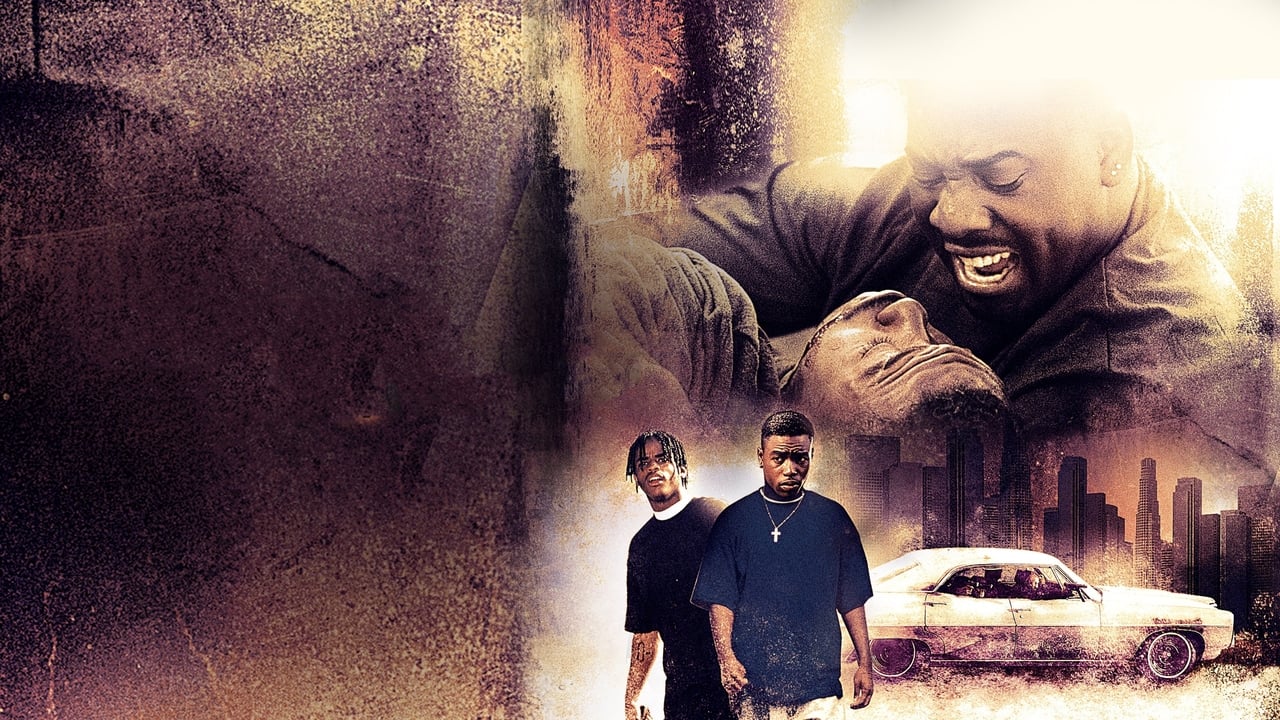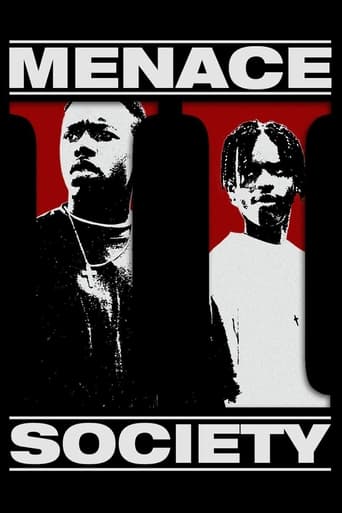

The film starts off with the murders at a convenience story, and introduces the voice-over narration of the story. I find that this voice-over does wonders at making the audience sympathize with Caine's character. He was born into this society, and therefore is not to blame for his actions and choices. Though his character is not as unpredictably violent like O-Dog, and is somewhat mild. He doesn't carry a gun, and his demeanour isn't that menacing. The voice-over helps to gain some insight into his thoughts and is thus more humanized.Tyrin Turner does a great job portraying his character. As a young boy on the edge of adulthood and just out of high school, Caine has no direction in life, and even has trouble answering whether he cares if he lives or dies. The many close-ups show his confusion at times and at others, his indifference to violence, implying his slow immersion into becoming like O-Dog. O-Dog is represented as a bit of a psychopath with no remorse or conscience for life. It takes little to set him off and Tate does a fantastic job of portraying this terrifying character.This film is well made and the directing shows it. The Hughes Brothers perfectly place juxtapositions of scenes together for maximum impact. The flashback comes in the beginning and establishes Caine's back story while creating sympathy for him. The composition of shots too are done nicely, and complements the way the characters tend to travel in groups.There is a lot of violence in this though, and it serves to show a realistic representation but can be very brutal. As mentioned before, it takes very little to upset O-Dog and turn him loose. The swearing is also very apparent and not one sentence goes by without them. Sometimes whole conversations go by with just cursing.Overall a very powerful representation of ghetto society, where importance is on staying together and protecting one's own. Masculinity is also obviously a very big issue as they constantly try to assert themselves through aggression and cursing. Read more movie reviews at: championangels.wordpress.com
... View MoreI saw , quite surprisingly, the critics liked it. I forgot my usual assessment, if the critics like it , beware. I watched the first few minutes and heard the over the top swearing, and had misgivings, don,t get me wrong I,m not averse to swearing, but gratuitous swearing, tends to detract from the content. The film forty eight hours has a great moment, when Nick Nolte,s girlfriend, calls him ,having been stood up for the second time, She says "Jack," he says "Yeh"" F---. you", and puts down the phone , great impact funny, not gratuitous because only a swear word would do. I didn,t continue to watch the film, and could,t see why anyone would like it let alone praise it. Critics seem averse to entertainment, action, or a "feel good story". Prefering some formulaic dreary repetitive "realism" type story.
... View MoreThis is a more intensified version of Boyz n' hood, and more the better. Opening with a shocking double murder in a Korean convenience store, committed by a pair of black teens, the star performers of the show, this flick doesn't hold back on the out of control exploits and wayward youth of South Bronz, or more so the community known as Watts. We live in the shoes of Caine, one the youths from the convenience store, while his bad arse mate, Kevin, played by Larenz Tate, with raw intensity in this electrifying flick, was the murderous hand, on the account of the Korean clerk, making an insult regarding the teen folks. He really judges the two the moment they walk into the shop. When stealing the store camera/videotape, they watched it repeatedly where Kevin makes a sick comment about selling these babies for $9.95 There are some powerfully violent moments, eye for an eye kind of stuff, especially in it's fatal end, it's catalyst that has Caine sticking his wick into one too many girls. The bit where Caine got shot bad, and taken into the hospital where he's bleeding bad was quite tense. Despite influences from family and teachers, to choose the right path, it's wasted on Kevin, his fate truly something scary, where Kane could change his tune, which this is the want of the viewer. The fine Samuel L Jackson who briefly appears in flashback scenes was memorable, imprinted in my mind, when blowing away another guy at home at a card game, while getting friendly with his misses. Caine almost mirrors that scene later, giving a guy one hell of a pounding, for cracking onto girlfriend (Jada Pinkett) in a very strong performance I must say. The whole movie is very well made, and goes further than Boy's N Hood, with true moments of choking intensity and moments of heavy shock violence, especially Caine's shot scene towards the early part of the film. But too it's very potent. All of these things are what betters it.
... View MoreA brutal and thoroughly realistic of life in the afroamerican dominated Watts district in Los Angeles. Depicting the life of one adolescent criminal Caine (Tyrin Turner) with little restraint or hints of glossing over the morality, "Menace II Society" is a harrowing piece and fascinating debut by the Hughes Brothers. Fragmented and chaotic in storytelling, much like the unplanned, unfocused everyday life the plot moves from event to event in a seemingly unconnected fashion, with only Caine being the stalwart throughout. Other characters appear briefly throughout like Caine's drug dealing father (Samuel L. Jackson), his unscrupulous friend O-Dog (Larenz Tate) or Islam convert Tony (Anthony Johnson) fill in point of views, context and give a wider outlook at life in Watts. Events are left touched, but unfinished, as if small captions of reality captured on screen. The key character of the movie is Caine himself, who is equally endearing as he is menacing, dangerous and morally corrupt, an amalgamate of good and evil, leaving viewers unable to fully define the person along such close-minded perceptions.This method of storytelling does make it touch watching, lacking suspense or story-build, failing to connect with the audience. Nonetheless by the final act, when all events seamlessly summarise the life of Caine we receive a really poignant conclusion. The overall impact has somewhat waned through time and the filmmaking deficiencies in cinematography, sound or basic storytelling take away from what is an otherwise gratifying experience.
... View More